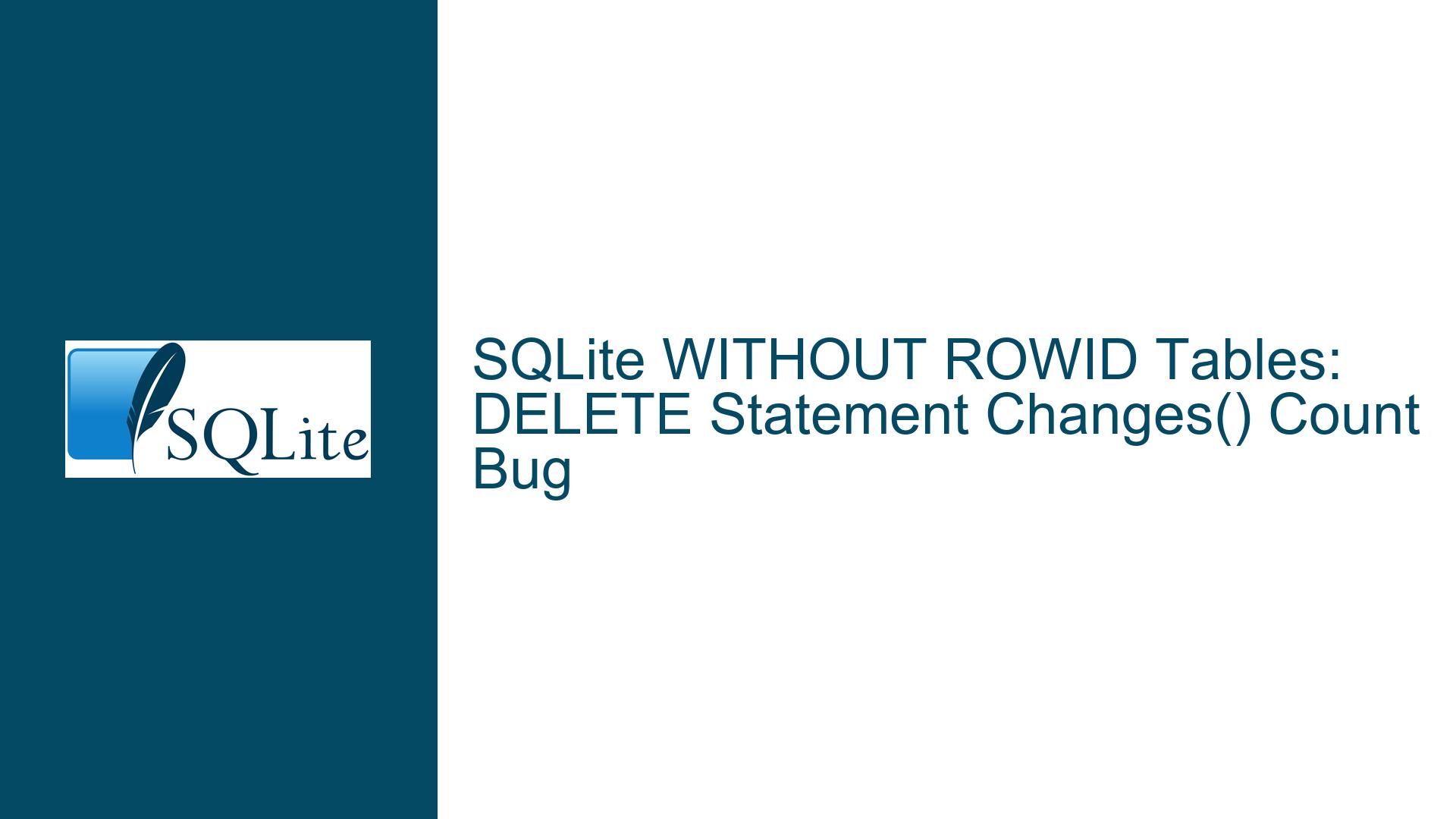SQLite WITHOUT ROWID Tables: DELETE Statement Changes() Count Bug
Unexpected Zero Changes() Count When Deleting From WITHOUT ROWID Tables
The SQLite database engine exhibits an anomalous behavior when executing DELETE operations on tables created with the WITHOUT ROWID option, specifically regarding the Changes() function’s return value. The core issue manifests when attempting to delete all rows from a WITHOUT ROWID table using a simple DELETE statement without explicit WHERE conditions. In these scenarios, the Changes() function incorrectly returns 0, despite successfully removing rows from the table. This behavior deviates from both the expected functionality and the behavior observed in regular tables with implicit rowids.
The issue’s significance extends beyond mere cosmetic concerns, as many applications rely on the Changes() function to verify successful database operations or implement transaction logic. The bug particularly impacts systems that need accurate row modification counts for audit trails, synchronization mechanisms, or operational verification. The anomaly specifically occurs in SQLite version 3.34.1 and earlier versions, though the exact introduction point of this behavior remains undocumented.
The technical nature of this bug stems from SQLite’s internal handling of WITHOUT ROWID tables, which utilize a fundamentally different storage and access mechanism compared to traditional rowid tables. WITHOUT ROWID tables store data directly in the b-tree structure using the primary key, eliminating the overhead of maintaining separate rowid values. While this optimization can improve performance and reduce storage requirements for certain use cases, it has inadvertently affected the row counting mechanism during DELETE operations.
Internal B-tree Operations and Counter Implementation Mismatch
The root cause of this anomaly lies in the interaction between SQLite’s b-tree implementation and its change counting mechanism when handling WITHOUT ROWID tables. Several technical factors contribute to this behavior:
B-tree Traversal Mechanics
The WITHOUT ROWID table structure employs a direct primary key b-tree organization, where records are stored and accessed differently from traditional rowid-based tables. During DELETE operations, the b-tree traversal mechanism fails to properly increment the internal changes counter, specifically when no WHERE clause is present in the DELETE statement.
Counter Update Logic
The changes counter update logic in SQLite was originally designed with rowid tables in mind, where the presence of an implicit rowid column provides a consistent mechanism for tracking modifications. In WITHOUT ROWID tables, the absence of this implicit column affects how the database engine tracks changes during bulk delete operations.
Query Plan Optimization
SQLite’s query optimizer handles DELETE operations differently based on the presence or absence of WHERE clauses. When a DELETE statement includes no WHERE clause, the optimizer may choose a different execution path that bypasses the normal row-by-row deletion process, leading to the counter increment mechanism being skipped for WITHOUT ROWID tables.
Primary Key Handling
The special handling of primary keys in WITHOUT ROWID tables introduces complexity in the delete operation’s internals. The primary key serves both as the record identifier and the storage key in the b-tree structure, requiring careful coordination between the delete operation and the changes tracking mechanism.
Comprehensive Resolution Strategies and Implementation Guidelines
Several approaches exist to address this issue, ranging from immediate workarounds to proper fixes following the SQLite update:
Immediate Workaround Implementation
The most straightforward solution involves modifying DELETE statements to include an explicit WHERE clause, even when intending to delete all rows. For example:
DELETE FROM table_name WHERE 1=1;
This approach forces SQLite to use the row-by-row deletion path, ensuring proper changes counting.
Version-Specific Solutions
For systems running SQLite version 3.34.1 or earlier, implementing a custom wrapper function can provide consistent behavior:
CREATE FUNCTION safe_delete(table_name TEXT)
BEGIN
EXECUTE IMMEDIATE 'DELETE FROM ' || table_name || ' WHERE 1=1';
RETURN changes();
END;
Long-term Fixes
The permanent solution involves upgrading to SQLite versions containing the fix (post check-in 820ae3b117c2d8c1). When upgrading, consider the following implementation details:
-- Verification query to ensure proper counting
BEGIN TRANSACTION;
CREATE TABLE test_table (
id INTEGER PRIMARY KEY NOT NULL
) WITHOUT ROWID;
INSERT INTO test_table VALUES (1), (2), (3);
DELETE FROM test_table;
SELECT changes() AS deleted_count;
ROLLBACK;
Application-Level Considerations
When developing applications that rely on accurate change counts, implement robust verification mechanisms:
BEGIN TRANSACTION;
SELECT COUNT(*) FROM target_table;
DELETE FROM target_table WHERE 1=1;
SELECT changes() AS affected_rows;
COMMIT;
Database Schema Design Guidelines
When designing schemas that require WITHOUT ROWID tables, consider these structural recommendations:
-- Recommended table structure for optimal delete tracking
CREATE TABLE optimized_table (
id INTEGER PRIMARY KEY NOT NULL,
data TEXT,
CONSTRAINT pk_without_rowid PRIMARY KEY (id)
) WITHOUT ROWID;
The resolution of this issue demonstrates the importance of thorough testing when implementing WITHOUT ROWID tables, particularly in scenarios involving bulk operations and change tracking. The fix implemented in SQLite’s codebase addresses the core issue by properly incrementing the changes counter during DELETE operations on WITHOUT ROWID tables, regardless of the presence or absence of WHERE clauses.
For systems unable to immediately upgrade to newer SQLite versions, implementing the WHERE clause workaround provides a reliable solution while maintaining application functionality. This approach ensures consistent behavior across different SQLite versions and table types, though at a potential minor performance cost due to the explicit row-by-row processing.






